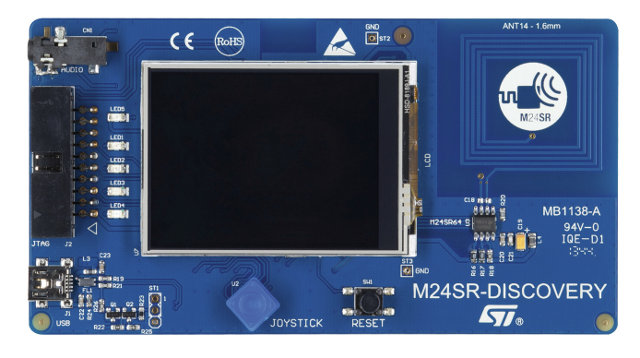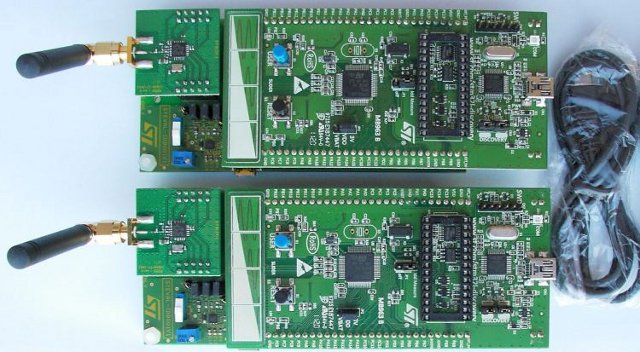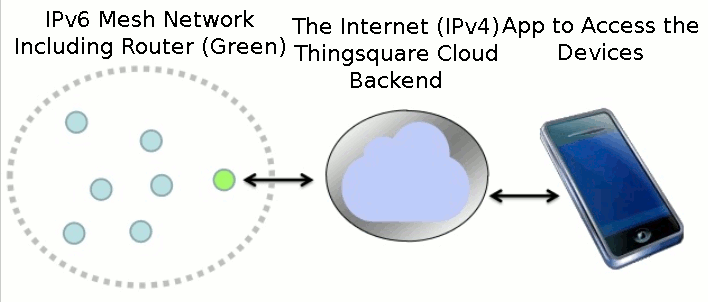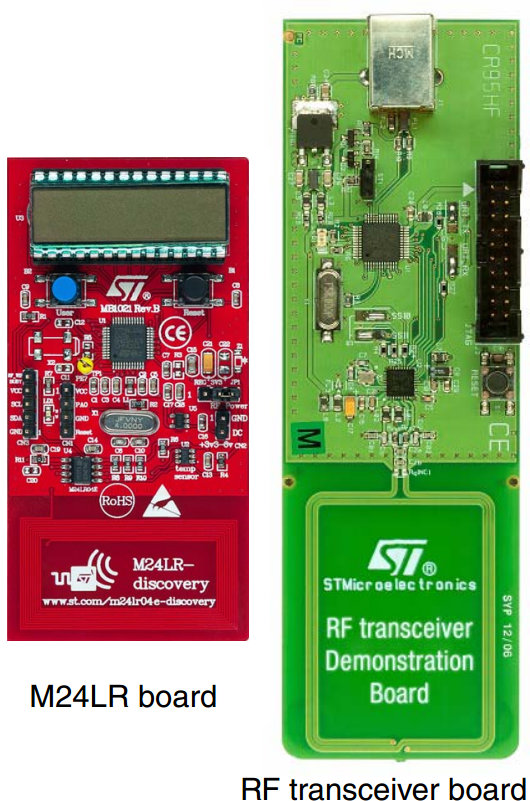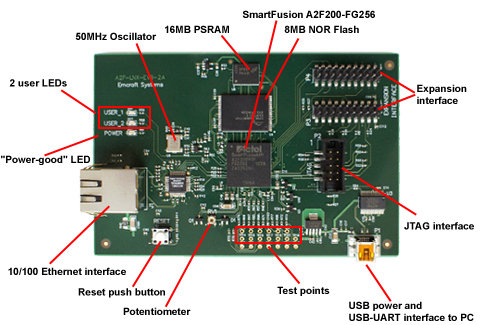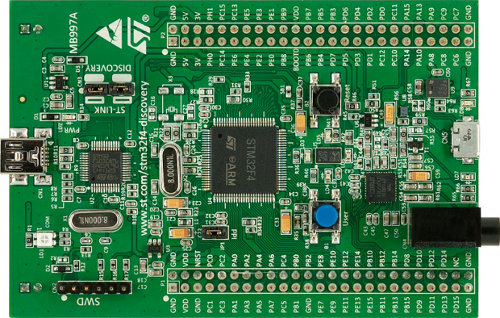STMicro STM32 has popular Cortex-M micro-controller found in the $2 “Blue Pill” board, STMicro’s own Nucleo Board, as well as many other variants. Olavi Kamppari (OliviliK), working on hard real-time control with EmBitz IDE, has created a detailed Wiki for STMicro STM32 on Github with lots of information, including an interesting comparison table of various STM32 Cortex M3 boards (and one GD32 board). I’ve reproduced the table in his wiki below, made is sortable & filterable, and added links to Aliexpress store found in other parts of the wiki. You can find much more details about each board in the Wiki. Thanks to Zoobab for the tip. Jean-Luc Aufranc (CNXSoft)Jean-Luc started CNX Software in 2010 as a part-time endeavor, before quitting his job as a software engineering manager, and starting to write daily news, and reviews full time later in 2011. www.cnx-software.com
STMicro To Launch $24 M24SR Discovery Kit for NFC Applications at Embedded World 2014
STMicro will unveil an a new development board called M24SR Discovery Kit absed on the company’s M24SR dynamic NFC tags to help designers easily add NFC connectivity to different kind of electrical devices such as fitness bands, loudspeakers, washing machines, water meters, and more. There are two models for MS24SR Discovery kits: Standard and Premium editions. The Premium editions adds a headset and a Bluetooth module to pair it with a smartphone via NFC. Here are the key features of MS24SR-Discovery board: MCU – STM32F103RGT6 64LQFP 32-bit microcontroller, with 1Mbytes of Flash memory NFC – M24SR64-Y Dynamic NFC/RFID tag Antenna – 31 mm x 30 mm, 13.56 MHz double layer inductive antenna etched on the PCB (ANT14) Display – LCD Color Screen (320 x 200 pixels) Misc – Different color LEDs, Joystick for menu selection Debug – JTAG connector for microcontroller firmware upgrade and debug Power – +5V via USB microB […]
Enter Wearable Tech Innovation World Cup 2013 for Cash Prizes and Free Development Kits
The Wearable Technologies Innovation World Cup is a yearly competition open worldwide, with prizes worth a total of $200,000, “designed to inspire and stimulate excellent next generation solutions with the potential to become real marketable products for Wearable Technologies on the subjects Sports & Fitness, Healthcare & Wellness, Security & Prevention, Gaming & Lifestyle”. This year, the contest is open between June 1, 2013 and November 30, 2013, and the good news is that even if you don’t win a cash prize, you can still purchase relevant devkit at a discount, or even get them for free. There are 3 companies involved who participate in the program from which you can get development kits: ST Microelectronics: STEVAL-IDB001V1(100% discount for the first 100 registrants) – STEVAL-IDB001V1 is a demonstration board based on STBLC01 low power Bluetooth low energy (BLE) controller and powered by STM32L MCU. Regular price: $159. STEVAL-MKI119V1 (No discount) – […]
Thingsquare Mist – Open Source Firmware for The Internet of Things
Thingsquare recently released the source code for the Thingsquare Mist firmware, an ultra lightweight router software (<4 kB memory) for the Internet of Things based on open Internet standards such as IPv6, RPL (Routing Protocol for Lossy networks), and 6lowpan. Thingsquare Mist allows to connect battery-powered wireless micro-controllers to the Internet, and is currently used in applications such as smart light bulbs, connected home appliances, and connected cities. The IPv6 mesh network is composted of nodes with a low power radio that communicate with the Mist router (Green), which in turn connect to the Internet and Thingsquare Cloud backend (Thingsquare Haven) to store the data, and/or receive control commands via Ethernet or Wi-Fi. The end users can then use an App to monitor, and/or control the devices remotely. Thingsquare Mist uses IETF RPL IPv6 mesh routing protocol (pronounced “ripple”) for IPv6 nodes communications. Thingsquare Mist runs on several low-power wireless […]
$17.50 STMicroelectronics M24LR Discovery Kit For NFC/RFID Batteryless Applications
STMicroelectronics has announced the M24LR Discovery Kit, a low cost development platform for NFC or RFID applications with energy-harvesting capabilities. This devkit is aimed at accelerating the design and development of batterlyless applications such as phone and tablet accessories, computer peripherals, electronic shelf labels, home appliances, industrial automation, sensing and monitoring systems, and personal healthcare products. The M24LR Discovery Kit consists of two boards: an RF transceiver board with a 13.56MHz multi-protocol RFID/NFC transceiver driven by an STM32 32-bit microcontroller A battery-less board that includes ST’s dual-interface EEPROM memory IC, an ultra-low-power 8-bit microcontroller (STM8L) and a temperature sensor. Here are the key features of the boards: M24LR board M24LR04E-RMN6T/2 Dual Interface EEPROM with I2C and ISO/IEC 15693 RF interfaces, 4 Kbits of EEPROM and password protection in SO8N package STM8L152C6T6 8-bit microcontroller, with 8 Kbytes of Flash memory STTS751-0WB3F, low-voltage digital temperature sensor 20 x 40 mm inductive antenna […]
uClinux on Cortex-M3/M4 MCU: The Costs, Performance and Power Consumption
I previously wrote about different options available to run Linux on Cortex M3 & M4 Microcontrollers, and more recently Vladimir Khusainov, co-founder and Director of Engineering at Emcraft Systems,wrote a longish article entitled “Practical Advice on Running uClinux on Cortex-M3/M4” on electronicdesign.com, where he explains how SoM are usually selected, the costs of running uClinux on Cortex M3/M4 MCUs such as Freescale K70 or STmicroelectronics STM32F2/F4, as well as performance and power consumption considerations. First, Vladimir addresses one comment that says there’s basically no use for uClinux on Cortex M3/M4 MCU, since external memory is needed and an ARM7/ARM9 modules (with MMU) can be purchased for almost the same price. There are 2 counter arguments to this point of view: In practice, customers usually select an hardware platform first, then think what OS can be used on the platform. For example, if a company decided to use an hardware based […]
Linux for Cortex M3 & M4 Microcontrollers
There are plenty of low cost Linux development boards based on Cortex A8 or A9 such as the Beaglebone, as well as some devkits based on ARM7 and ARM9 such as SAM9 development kits , but if your application is cost and/or energy sensitive you can also switch to micro-controllers using Cortex M3 or M4 based development boards such as Emcraft SmartFusion devkits. You can run a functional uCLinux system with 1MB of RAM and 1MB of flash including the TCP/IP stack. You need to use uClinux and not directly Linux, because the Cortex M3 doess not have a Memory Management Unit (MMU) and only a Memory Protection Unit (MPU). This can bring some interesting software development challenges such as (apparently random) kernel panics, the lack of fork, memory fragmentation and more. You can check out http://kernel.org/pub/linux/libs/uclibc/Glibc_vs_uClibc_Differences.txt for the main differences between uClibc and Glibc. The instructions to patch and […]
ST Micro 15 USD STM32F4-Discovery Cortex-M Development Kit
ST Microelectonics promote their Cortex-M series at ARM Techcon 2011 and especially the new STM32F4 series the most powerful cortex M4 MCUs. They also showcase a low cost development board called STM32F4-Discovery that they give away at the exhibition and that can be bought online for 14.90USD from distributors. The evaluation board is based on the STM32F407VGT6 and includes an ST-LINK/V2 embedded debug tool, two ST MEMS, digital accelerometer and digital microphone, one audio DAC with integrated class D speaker driver, LEDs and push buttons and an USB OTG micro-AB connector. A large number of free ready-to-run application firmware examples are available in the STM32F4-Discovery board firmware package to support quick evaluation and development. Key Features of the Development kit: STM32F407VGT6 microcontroller featuring 32-bit ARM Cortex-M4F core, 1 MB Flash, 192 KB RAM in an LQFP100 package On-board ST-LINK/V2 with selection mode switch to use the kit as a standalone ST-LINK/V2 […]



